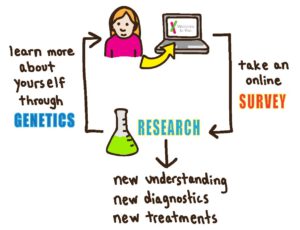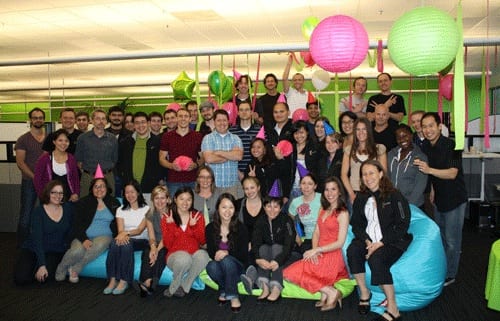
The typical five year-old is pretty confident, filled with energy and imagination. Maybe a little loud.
Yesterday, 23andMe turned five.
We’re brimming with vigor and vision. Still a little brash.
Conceived with the goal of allowing people to explore their genetic information, 23andMe uses new tools that allow people to gain insight into their ancestry, genealogy and health.
Who knew that would be so controversial?
On top of giving people access to their genetic information, we’ve invited them to join our new research paradigm. This idea inspired the vision for creating the company in the first place. Build an ever-growing database of genetic information to accelerate research and engage people in that exploration.
In the five years we’ve been in business we’ve done just that.
Tens of thousands of people have sifted through their genetic information at 23andMe.
They’ve found everything from whether they’ve got a “sprinter’s gene,” to a friend in Norway who’s actually a fifth cousin to whether they have an elevated genetic risk for breast cancer.
The draw of finding out more about ourselves individually empowers us to find out more about ourselves communally.

Our first proof-of-concept study uncovered associations with common traits like hair curl, eye color, and whether you can smell the by-products of asparagus. Since then, we’ve presented preliminary findings from our studies uncovering novel genetic links to childhood and adult infections, Parkinson’s disease, and hair traits. And our studies have replicated more than 100 previously identified genetic associations for dozens of common diseases and medical conditions. All in a fraction of the time it typically takes to conduct such studies.
We are still enrolling people in our new Sarcoma community. We plan to combine genetic information with survey data to detect patterns for better understanding the biology of sarcoma.
Our research initiatives have already begun to yield results.
Earlier this month at a workshop sponsored by the National Institute for Neurological Disorders and Stroke (NINDS) in Washington, D.C. our scientists presented more discoveries from our growing Parkinson’s Disease Research Initiative. Working with our partners – the Parkinson’s Institute and the Michael J. Fox Foundation, among others – and the people who have volunteered to be part of this ongoing research we conducted the largest genome-wide association study of Parkinson’s based on a single cohort. Almost 3,500 people with Parkinson’s participated and another 30,000 people were included as part of a control group. The number of people with Parkinson’s who’ve now enrolled in our on-going study has grown to about 5,000. We hope to reach 10,000.

The study identified a substantial genetic component underlying the development of the debilitating disease. The work also identified two new genetic variants associated with Parkinson’s and confirmed 20 other genetic associations previously identified including variants near the LRRK2, GBA, SNCA, MAPT, GAK, and the HLA genes. We are planning to publish these results soon.
23andMe scientist Dr. Chuong Do said the work in this study indicates the heritability of Parkinson’s disease is at least 25 percent.
But the work has really only scratched the surface. The next step is collaborating with several other groups and combining data sets to look at perhaps as many as 15,000 cases. Do feels confident that additional novel variants will be found that could help shed more light on the disease.
In the meantime, 23andMe customers now can access updated information about the genetics of Parkinson’s disease in their accounts. We have added four well-established genetic associations to the calculation of risk for Parkinson’s disease, of which three are also applicable to East Asian populations. We plan to update the Parkinson’s Disease report again soon once our own study is published.
Our first five years have been exciting, inspiring, and rewarding. Thank you to all of our customers, collaborators, and research contributors.
We’re still discovering the power of genetics to inform and inspire both intellectual and personal exploration. We hope you’ll continue on this journey with us.
